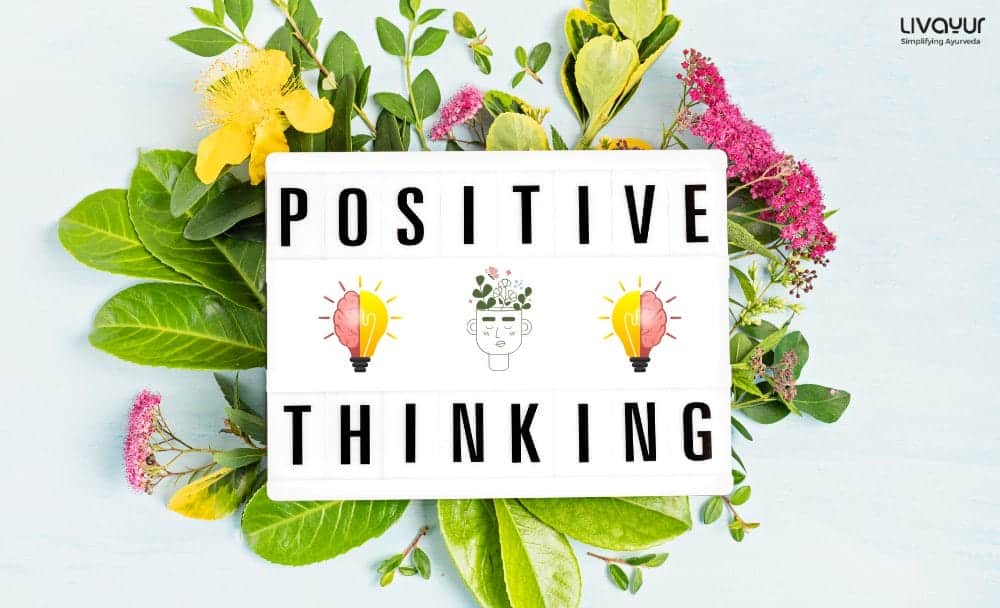
With our skeptical brains, many of us dismiss the notion of positivity or positive thinking out of hand. Yet, from our personal interactions and experiences, we often describe situations and people as giving us ‘the creeps’ or sending out ‘positive vibes’. This contradiction is understandable as we are only now beginning to understand the mind body connection that Ayurveda has recognized for thousands of years.
What Ayurveda tells us about Positive Thinking
Although positive psychology may be a modern construct, the principles were well-integrated into Ayurveda millennia ago. In fact, Acharya Charaka gave us a branch of Ayurvedic medicine called Sattvavajaya Chikitsa (SC), which is basically a form of Ayurvedic psychotherapy (1). In Ayurveda, the approach of therapy is non pharmacological, taking an approach not dissimilar to that behavioral psychology.
The main idea is to replace negative thoughts with positive ones, with a concept described as Pratipaksha bhavana. This basically means thinking thoughts of an opposing quality. This emphasis on positivity is regarded as critical for health and wellbeing because of the influence of a positive mind on the body.
How Does Positive Thinking Impact your Mind and Body

With the stress and grief that we have to deal with, positive thinking can be a challenge for many of us, but it’s well worth the effort. Here are some of the proven benefits of positive thinking.
Healthy Immunity
The impact of the mind on physical health and susceptibility to infections has long been recognized in Ayurveda, but it is now supported by modern research. Several studies have found that individuals who are optimistic and have a positive mental attitude exhibit a stronger immune response when exposed to disease causing pathogens, while negative emotions have the opposite effect (2).
Improved Wellbeing
Stress, anxiety, and negative thinking are known to make us more vulnerable to unhealthy and risky behaviors. You are more likely to drink excessively, smoke, skip your exercise, avoid health checks, or sleep less when you are negative. On the other hand, positive thinking is associated with improved health management and consequently better health.
Mentally Strong
When faced with obstacles and stressful situations, positive thinking makes it easier to respond effectively. This has also been observed by researchers studying the emotional and mental health impact of the 9/11 terrorist attacks on the United States (3). They found that positive thinking works as a buffer, reducing the risk of depression and anxiety disorders even when faced with personal tragedy.
Strategies to Develop a Positive Attitude

Meditation
Meditation takes center stage in Ayurveda and Yoga, when it comes to the management of not just mental health, but also spiritual and emotional wellbeing. Today, meditative practices that cultivate mindfulness are also used in clinical psychology to reduce stress levels, relieve anxiety, and cultivate healthy behaviors.
Recognize Negativity
Meditation and mindfulness will help significantly in this regard, as it makes it easier to introspect and identify negative thoughts and emotions. You can also confide in loved ones who you trust to help with this exercise. Identifying such thoughts and emotions is the first step to overcoming them.
Confront & Challenge your Negativity
Once you have identified those negative thoughts, you can begin to confront and challenge them. Every time you hear that negative voice in your head, filling you with self-doubt or guilt, challenge it by responding with positive self-talk. Studies show that even small changes in the way you talk to yourself and think can improve your ability to control emotions and cope with stress (4).
Practice Gratitude
The best way to get started is by picking up a journal and noting down things that you have reason to be grateful for, whether its your friends, family, roof over your head, or your health. Research shows that this practice can help cultivate optimism and a positive energy in your life (5).
It isn’t always easy to be positive, especially when life can be incredibly tough. If you find yourself still struggling to cope with negative thoughts, reach out to a counsellor, psychologist, or an Ayurvedic physician for more help.
This article is reviewed by Suchitra Marwah


























114 Comments